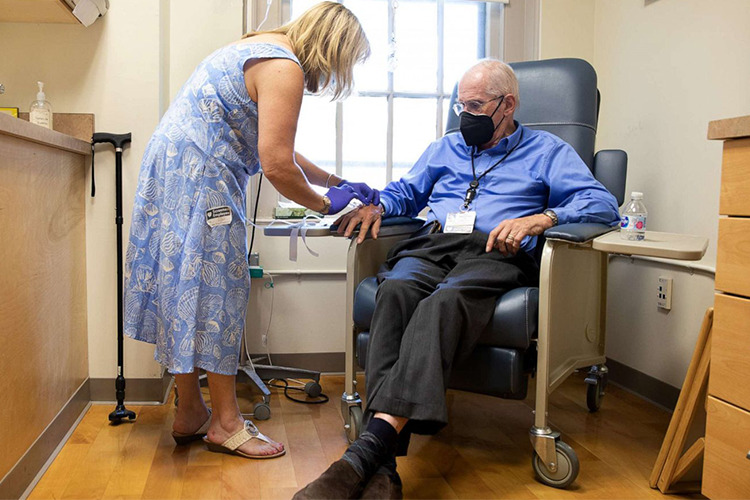
Alzheimer’s patient receiving treatment from a nurse. photo by Kayana Szymczak
Early this year, the FDA approved a drug that slows the symptoms of Alzheimer’s.
Discovered in 1906, Alzheimer’s disease is still one of the most devastating illnesses in modern history. It is an irreversible brain disorder that causes memory loss and the deterioration of other mental functions. Being the most common form of dementia, over 500,000 Americans are diagnosed with it every year. Even with modern medicines, Alzheimer’s remains an incurable disease. However, there is new hope as the Food and Drug Administration has approved a new drug to help slow its symptoms.
Alzheimer’s can act quickly or slowly, and the average affected person lives around eight years after symptoms first arise. It is caused by the breaking up of nerve cells in the brain. In a healthy brain, these brain cells remain connected through the synapses. One of the causes of this is the buildup of proteins that cause structures called plaques and tangles to form in the nerves, eventually leading to cell death. Another cause of Alzheimer’s is the lack of chemicals that act as signalers from cell to cell, causing nerve signals to travel slowly.
Though it is not a genetic disease, those whose family members have been affected are more likely to get diagnosed, and scientists have found many genes that link to Alzheimer’s. Specifically, one named APOE-e4 has been found in 40- 65% of all Alzheimer’s patients. This is one of many versions of the APOE gene, and each person inherits a version from their parents. Those who inherit the APOE-e4 are at higher risk of developing Alzheimer’s.
Since the discovery of the disease, there have been few treatments other than encouraging lifestyle changes, such as diets, exercise, and social interaction. There are also very few helpful medicines. However, only six days into the new year, the FDA released news of accelerated approval for Leqembi, a new drug that targets the physiological process of Alzheimer’s. This treatment not only focuses on symptoms but also slows the progression of the disease.
The drug was approved after the third phase of experiments, where researchers started a trial on patients authorized to try the new medicine. They tested 856 patients with mild cognitive impairment and injected about 10 milligrams of the drug every two weeks. To set the control, the researchers also used a placebo on other patients to prove it made a difference. Around the 79th week of the trials, those who received the treatment showed significantly reduced damage to their brain cells and slowed the progression of the disease. Those given the placebo saw no statistical change.
Laqembi brings new hope for patients and family members today and in the future. As Savannah Hansen-Hahn, a junior at Thomas Jefferson, highlights, it brings great relief. Hansen-Hahn’s great-grandmother died in her early eighties after a four-year battle with Alzheimer’s disease. As she and her mother are both at risk, she expressed reassurance that this drug can slow the progression. Before her great-grandmother died, she was in home hospice care and had nurses constantly coming into her home. “She declined really fast… she got really aggressive, and it got bad.” Hasen-Hahn said it was scary as a child to watch her go through it. Now that she is older and more aware of the greater risk her family has of getting diagnosed, she finds those memories more frightening. However, Hansen-Hahn is relieved due to having more advanced medicines that her grandmother did not. “My mom and I were just talking about [Laqembi] because both of us are susceptible… so I think it’s kind of cool to have more options.”
Though Alzheimer’s is still not curable, every new medication is huge news for patients and their families. Scientists have been working hard to expand the lifespan and memories of patients, and this new drug is a great step towards this goal.